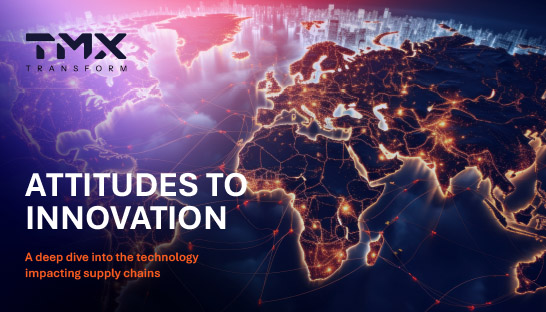A new report has revealed that the vast majority of supply chain’s top decision makers who have implemented innovative technology solutions are predicting business growth in the next 12 months. Two-thirds of supply chain bosses also believe technology innovations will be the key driver for business growth – however, nearly half don’t know how best to use them in daily operations
Travis Erridge, TMX Transform CEO, said of the study, “In the last few years, global conflicts, environmental crises, major trade disruptions and a pandemic have starkly revealed how vital a resilient supply chain is for business continuity. The companies who have been able to plan ahead, think progressively and be open to change have thrived, while those holding on to old processes have been left behind. Technology is paramount in adapting to this new reality, where supply chain becomes a strategic business advantage to unlock customer satisfaction.”
The research surveyed more than 250 global supply chain and logistics decision-makers and provides insights into the awareness, attitudes, and uptake of innovative supply chain technology such as AI, predictive analytics, automation and simulation among industry leaders. According to the findings, supply chain leaders are mirroring mounting confidence among executives that their operations will perform well in the coming months – with 80% anticipating business growth in the next year.
A lot of this is still driven by excitement around technology. A 62% majority of supply chain decision makers citing technology as a key driver for business growth.
In particular, leaders anticipate that predictive analytics will have the greatest positive impact – with 94% saying they would positively benefit operations by helping adapt to peaks in demand, and weaknesses exposed by climate and geopolitical crises. Autonomous vehicles and digital twins also generated plenty of excitement (though, interestingly, after two years of hype, a much lower 84% of leaders in supply chain think AI will benefit them).

The most implemented tech solutions are predictive analytics (62%), sustainable tech to reduce carbon footprints (59%), and the Internet of Things (52%). According to the data, predictive analysis has had the greatest impact on businesses, with 94% citing the technology has had a positive impact on their business.
In spite of the prevalence leaders attribute to technology for their supply chain efforts, however, there does seem to be a worrying lack of knowledge about what it actually does. According to TMX, nearly half of executives do not know how best to use technology in daily operations – and this is having a clear impact on the transformations they undertake – with 45% admitting to struggling to effectively implement solutions.
Exemplifying how they might be setting themselves up to fail, almost a quarter of respondents were unsure about AI/Machine Learning capabilities, while 60% are uncertain about what simulation/digital twins technology is, or does.
Tom Fitz-Walter, TMX Transform executive director for supply chain, commented, “Automation and technology are crucial in addressing the pressing issue of labour shortages in supply chains. However, experiencing the biggest benefits of technology hinges more on people than the technology itself. As organisations face challenges like high staff turnover and a lack of experienced leaders, nurturing and retaining skilled personnel becomes essential to successfully implementing technology solutions and driving innovation.”


